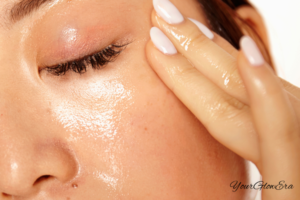If you have oily skin, you’re likely all too familiar with the constant battle against excess shine, clogged pores, and the search for products that don’t leave your face feeling greasy.
Achieving a glowing complexion with oily skin may seem like an impossible task, but it’s not!
With the right glowing skin tips for oily skin, you can learn how to balance oil production and achieve the radiant, dewy look that’s the envy of those with drier skin types.
The key is to take care of your skin, choose the right products, and follow a routine that works for your unique skin type.
This blog post will provide you with detailed, actionable advice on how to control excess oil while maintaining a beautiful, healthy glow.
We’ll cover everything from cleansing techniques to lifestyle changes that can help you get the best possible results.
Table of Contents
Understanding Oily Skin: What’s Really Going On?
Before we dive into glowing skin tips for oily skin, it’s essential to understand what causes oily skin in the first place.
Oily skin mainly occurs when the sebaceous glands become hyperactive, resulting in an excess of sebum—the body’s natural oil that nourishes and shields the skin.
Sebum is necessary for keeping skin hydrated and providing a protective barrier. Nonetheless, excessive sebum production can cause blocked pores, breakouts, and a glossy look on the skin.
Various factors may influence oily skin, such as:
• Heredity: If oily skin was common in your family history, you are more likely to experience it as well.
• Hormones: Hormonal fluctuations during puberty, menstruation, pregnancy, and even stress can trigger excess oil production.
• Diet: Consuming too many greasy foods or processed items can affect the oil balance in your skin.
• Environmental Conditions: Warm, moist climates can stimulate your skin to generate additional oil to defend itself.
• Inadequate Skin Routine: Using aggressive skincare products that remove the skin’s natural oils may prompt increased oil production as the skin attempts to rebalance itself.
Understanding these factors will help you manage your oily skin and focus on achieving the right balance.
Key Glowing Skin Tips for Oily Skin
Now that we know why oily skin occurs, let’s explore some glowing skin tips for oily skin to help you reduce shine, control oil production, and maintain a fresh, glowing complexion.
1. Cleansing is Essential – But Don’t Overdo It
One of the most important steps in achieving glowing skin for oily skin is using the right cleanser.
Cleansing helps remove dirt, oil, and impurities from the skin, but it’s important to choose a gentle formula.
Strong soaps and harsh cleansers can remove the skin’s natural oils, prompting your sebaceous glands to increase oil production. This often results in dryness, irritation, and paradoxically, increased oiliness.
Opt for an oil-free, gel-based or foaming cleanser that is formulated specifically for oily skin.
Search for components such as salicylic acid, which assists in regulating oil levels and reducing the likelihood of clogged pores. Steer clear of products with alcohol, as they can excessively dry out your skin.
• Expert Tip: Wash your face two times daily—once in the morning and once before sleeping. Over-cleansing can irritate your skin and strip it of necessary moisture, so aim for a balanced approach.
2. Exfoliate Regularly (But Not Too Often)
Exfoliation is a key step in the process of achieving glowing skin for oily skin. By removing dead skin cells, exfoliation helps prevent clogged pores, which can lead to acne and dullness.
Regular exfoliation also helps your skincare products penetrate better, making them more effective.
For oily skin, consider using a gentle exfoliator that contains chemical exfoliants like salicylic acid or glycolic acid. These exfoliants work to dissolve dead skin cells and prevent buildup within your pores.
Physical exfoliants (scrubs) can be harsh on oily skin if used too frequently, so stick to chemical exfoliants that provide more gentle exfoliation, as recommended in glowing skin tips for oily skin.
• Expert Tip: Exfoliate your skin 2 to 3 times per week. However, avoid over-exfoliating, as it can cause irritation, increase oiliness, and lead to breakouts.
3. Staying Hydrated Matters – Make sure to moisturize
Many people with oily skin make the mistake of thinking that they don’t need moisturizer. However, neglecting this important step can cause your skin to produce more oil.
Even oily skin requires proper hydration to stay balanced. The best approach is to use a lightweight, oil-free moisturizer that won’t clog your pores.
Look for gel-based or water-based moisturizers with ingredients like hyaluronic acid, which helps keep your skin hydrated without making it greasy, following glowing skin tips for oily skin.
These types of moisturizers can help balance oil production while maintaining a smooth, glowing complexion.
• Pro Tip: Apply moisturizer to your skin after cleansing and exfoliating to lock in hydration and keep your skin feeling fresh throughout the day.
4. Use a Mattifying Primer to Control Shine
If you’re looking to control oil throughout the day, a mattifying primer can be a game-changer.
These primers help create a smooth base for makeup while controlling shine, so your skin looks fresh and matte without the need for constant touch-ups.
A mattifying primer can be a game-changer by helping to reduce the appearance of pores, absorb excess oil, and keep your makeup looking fresh and in place for longer.
These products are especially beneficial for those with oily T-zones, as they help control shine in these oil-prone areas.
• Pro Tip: Apply primer to your T-zone (forehead, nose, chin) and blend it outwards for the best results.
5. Protect Your Skin with Sunscreen
Sunscreen is an essential step in any skincare routine, and it’s particularly important for oily skin, as emphasized in glowing skin tips for oily skin. Some people avoid sunscreen because they think it will make their skin more oily, but this isn’t true.
There are plenty of oil-free, non-comedogenic sunscreens available that provide the necessary protection without clogging pores.
Search for sunscreens that are breathable, oil-controlling, and formulated for oily or acne-prone complexions.
Mineral-based sunscreens featuring zinc oxide or titanium dioxide are frequently suggested for oily skin, as they are less prone to clogging pores or causing breakouts, as recommended in glowing skin tips for oily skin.
• Pro Tip: Apply sunscreen every morning, even on cloudy days, and reapply throughout the day if you’re spending time outdoors.
6. DIY Face Masks for Oily Skin
If you prefer natural remedies, you can make your own face masks at home to target oily skin. Many common kitchen ingredients, like honey, yogurt, and clay, work wonders for oily skin.
For example, clay masks are great for absorbing excess oil and unclogging pores, while honey can help soothe and moisturize the skin, following glowing skin tips for oily skin.
Here are a couple of DIY facial treatments suitable for oily skin:
• Clay Mask: Mix bentonite clay with water or apple cider vinegar until you achieve a smooth consistency. Spread it evenly over your face and leave it on for 10–15 minutes before rinsing off. Clay masks are effective at absorbing excess oil and cleansing the skin.
• Honey & Lemon Mask: Combine honey with a small amount of lemon juice. Apply the mixture evenly to your face and let it sit for 10–15 minutes before rinsing. Honey offers antibacterial benefits that help combat acne, while lemon brightens the complexion.
• Pro Tip: Apply a mask 1–2 times a week for optimal results.
7. Monitor Your Diet for Better Skin
What you eat can have a significant impact on your skin’s appearance, including how oily it is. Consuming too much processed or greasy food can lead to an increase in oil production.
On the other hand, eating a diet rich in fruits, vegetables, and whole grains can help balance your skin and promote a healthy glow.
Consuming foods high in antioxidants, like berries, leafy greens, and nuts, can assist in shielding your skin from harm and maintaining its natural oil regulation.
Drinking plenty of water is also crucial for maintaining hydration and preventing the skin from becoming too oily.
• Pro Tip: Focus on a diet with healthy fats (like omega-3 fatty acids from fish or flax seeds) to help balance oil production and maintain healthy skin.
How to Make Oily Skin Fair and Glowing?
While there’s no magical way to instantly lighten your skin, you can use glowing skin tips for oily skin to brighten your complexion and achieve a radiant look.
Start by focusing on a consistent skincare routine that includes gentle exfoliation, hydration, and sun protection. Incorporating products with vitamin C can help lighten dark spots and improve overall skin tone.
Additionally, making healthier lifestyle choices, such as getting enough sleep, reducing stress, and staying hydrated, will all contribute to your skin’s radiance.
Glowing Skin Secrets for Oily Face
Achieving glowing skin with an oily face requires consistency. In addition to skincare routines, daily habits and lifestyle choices significantly influence the path to a radiant, glowing complexion.
Make sure to manage stress effectively, get enough sleep, and stay hydrated throughout the day.
Lastly, always remember that glowing skin isn’t about perfection. It’s about finding the right balance that works for your skin type and loving yourself throughout the process.
Neglecting the Eye Area
The skin around your eyes is delicate and thinner than the rest of your face, making it more prone to fine lines, puffiness, and dark circles, as highlighted in glowing skin tips for oily skin. Many people neglect their eye area or use the wrong products, leading to dryness and irritation.
Why You Need Eye Cream:
• Eye creams are formulated to target specific concerns like puffiness, dark circles, and fine lines.
• The sensitive skin surrounding the eyes needs gentle treatment and adequate moisture.
Affordable Choice: Cetaphil Hydrating Eye Gel-Ceam is a soothing, budget-friendly option that helps diminish puffiness and brighten dark circles.
Using Too Many Actives
Active ingredients like retinol, vitamin C, and AHAs can work wonders for your skin, but using too many of them at once can lead to irritation, redness, or dryness.
It’s important to introduce active ingredients gradually and pair them wisely to avoid overloading your skin, following glowing skin tips for oily skin.
Budget-Friendly Recommendation: The Ordinary Retinol 0.5% in Squalane is a gentle yet effective retinol that works well for most skin types, as suggested in glowing skin tips for oily skin.
When to Consult a Dermatologist?
If you’ve tried various glowing skin tips for oily skin and have not seen improvement, it might be time to consult a dermatologist.
A professional can help you assess your skin condition and identify any underlying causes of excessive oil production or acne.
Dermatologists may recommend prescription treatments, stronger exfoliants, or even lifestyle modifications that can help you achieve clearer, glowing skin, as part of glowing skin tips for oily skin.
Conclusion
Achieving glowing skin tips for oily skin doesn’t have to be a difficult or expensive process.
By following the right skincare routine, using the right products, and making healthier lifestyle choices, you can successfully balance oil production while maintaining a radiant glow.
Remember, consistency is key—don’t be discouraged if you don’t see immediate results. With time and patience, you’ll achieve the glowing, oil-free skin you’ve always desired, as promised in glowing skin tips for oily skin.
“How to Choose the Perfect Hydrating Face Mask Sheet for Maximum Moisture“, is your guide to achieving deeply hydrated, glowing skin. We explore the best ingredients to look for in hydrating face masks, from aloe vera to hyaluronic acid, and how they work to lock in moisture.
Choosing the right face mask sheet can make all the difference in boosting your skin’s hydration levels, following glowing skin tips for oily skin.Learn how to pick the perfect mask for your skin type and needs. Check out our detailed guide on how to choose the right hydrating face mask for maximum moisture and glowing skin.
Frequently Asked Questions
How to stop oily face?
To control oily face, avoid over-washing, use oil-free skincare products, and apply mattifying primers. Use blotting papers during the day to absorb excess oil.
Can I rub lemon on my face?
Lemon can be used sparingly for oily skin, but it can be too harsh and cause irritation. Always dilute lemon juice and perform a patch test before use. Avoid it if you have sensitive skin.
Is milk good for oily skin?
Milk can be helpful for oily skin due to its natural exfoliating properties, but it’s best used in moderation. Avoid heavy dairy consumption if you find it contributes to acne or oiliness, as suggested in glowing skin tips for oily skin.
How to become fair naturally in 7 days?
Achieving fairer skin naturally requires a consistent skincare routine. Focus on brightening agents like Vitamin C, avoiding the sun, and regularly exfoliating to reveal fresh skin, following glowing skin tips for oily skin.
Can we apply lemon on lips?
Lemon can be used on lips to lighten dark pigmentation, but it may cause dryness. Always follow with a hydrating lip balm.
Which brand is best for oily skin?
Brands like Cetaphil, Neutrogena, and La Roche-Posay offer excellent products for oily skin. Look for oil-free, non-comedogenic products that balance oil without causing dryness, as recommended in glowing skin tips for oily skin.
What is the best female body wash?
For oily skin, choose a body wash that is gentle, oil-free, and sulfate-free, following glowing skin tips for oily skin. Products with tea tree oil or salicylic acid can help control body acne and balance oil.
Is Dove good for oily skin?
Dove offers mild body washes that can be good for oily skin, but be cautious if you have acne, as suggested in glowing skin tips for oily skin. Dove’s hydrating formulas may not be as effective for managing excess oil on the face.
What is the best face wash for oily skin?
The best face wash for oily skin should contain ingredients like salicylic acid, tea tree oil, or glycolic acid, according to glowing skin tips for oily skin. Try Neutrogena’s Oil-Free Acne Wash or La Roche-Posay’s Toleriane Purifying Foaming Cleanser.
Is vitamin C good for oily skin?
Yes, vitamin C is great for oily skin! It helps brighten the skin, reduces the appearance of dark spots and hyperpigmentation, and promotes collagen production. It also has antioxidant properties that protect the skin from environmental damage. Look for a lightweight, oil-free vitamin C serum to avoid clogging pores while benefiting from its brightening and anti-aging effects, as suggested in glowing skin tips for oily skin.









Leave a reply